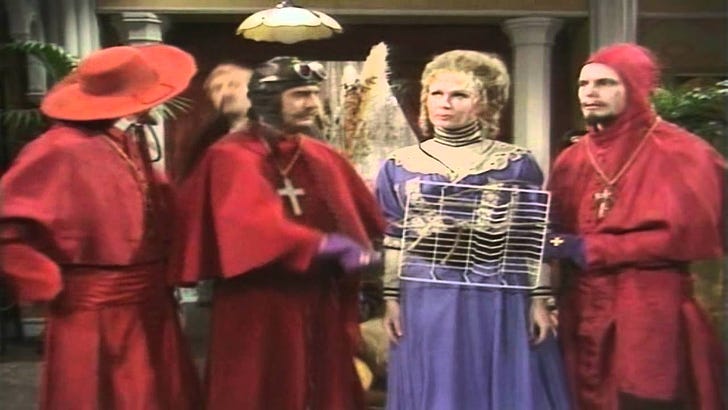Obviously, nobody expected the Spanish Inquisition…
But historically, it seems that nobody expected the prayers for rain by the Spanish church either. Last Friday, I wrote about a study that showed all kinds of correlation that can be found when one has two time series that are remotely linked to each other. This week, I can go a step further.
One of the most powerful results one can find in an academic study is not just correlation, but causation. And the typical statistical test for causation is the Granger causality test. Most people (me too) start to put more weight on a result if the researcher can show that one time series ‘Granger-causes’ another time series.
So, what if I tell you that the Catholic church in Murcia praying for rain Granger-causes rainfall in that region?
That is the result of a study of researchers from Yale University and the University of Murcia in Spain. They looked at rainfall data in Murcia from 1600 to 1837 and compared that data to the prayers held in local churches during these years. They found that when the priests started to ask their flock to pray for rain, in the following months, rain did indeed start to fall. Broadening the geographic scope, they also found that in societies that prayed for rain (independent of their religious beliefs) there was a 43% higher chance of rain falling after the societies started to pray for rain.
Maybe we should go back to praying for rain given the prevalence of droughts in many countries this summer?
But of course, as you may have guessed it isn’t the prayers that cause the rain. Instead, the Catholic church in Murcia like so many religious institutions around the globe were good at keeping records. And in the days before weather forecasts, they knew that at certain times of year, rain was more likely to fall than at others.
Likelihood of rainfall in Murcia and frequency of prayers for rain
Source: Espin-Sánchez et al. (2023)
Hence, when it became likely that in the coming weeks and months rainfall would increase, the Catholic church started to pray for rain. And crucially, once they started praying for rain, they didn’t stop until rain really started to fall. If you want to create the illusion that your prayers make rain fall, you can’t just pray for rain one day and then stop. If the rain then doesn’t fall, you have been caught out and people may start doubting your influence with God (or the Gods). So, once you have committed to praying, keep praying until you are proven right. And then claim success.
And lest you think that is just a historical anomaly with no relevance for today, think about the Cassandras I have written about that promise doom and gloom. Their trick is similar. At some point they start predicting a catastrophe. And then, the worst mistake they can make is stop predicting that catastrophe because if they do and no catastrophe happens, people will catch on to them. Instead, keep arguing that the catastrophe is just delayed for one reason or another.
Remember the guy who said Japan was a bug in search of a windshield? That was in 2010. Today, his view is that Japan is no longer alone, and that the US is in a similar position, only to conclude that “that which can’t go on, won’t. We can’t keep piling on debt at this rate forever, and we can’t repay what we have”. Maybe, maybe not, but I have made my point here.





Hmmmm… call me a shameless sceptic now, but how’s this for a possible explanation of cause and effect:
1. No rain falls
2. No rain falls some more
3. Desperate people start praying
4. Mean reversion happens to some degree and rain falls a bit
Not dissimilar to some people’s belief in the RSI
Beware of folks who start worrying about government debt when the Prez is a Democrat, and stop when it's a Repub at the helm. Then, it's politics, not economics.